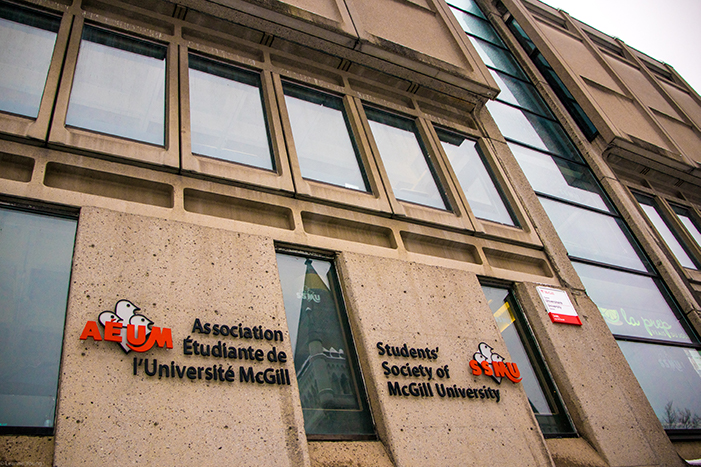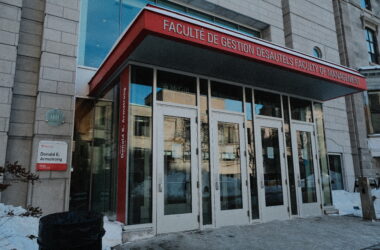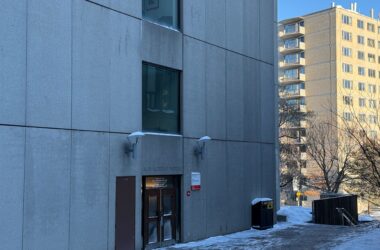The Students’ Society of McGill University (SSMU) Board of Directors (BoD) convened on Nov. 18 to ratify several motions and hear two presentations: A pitch to purchase a membership to “Lobby”—an online sharing platform that can host social events—and another presentation by the Office of Investments about McGill’s investment portfolio. The board also called on members to volunteer for committee roles for the 2021-2022 school year. SSMU president Darshan Daryanani and general manager Daniel Dufour continued their string of absences from SSMU BoD and Legislative Council meetings.
The board unanimously approved the motion to ratify the Services Review Committee Report and the Clubs Committee Report. The motion to purchase 2,000 monthly seats for Lobby at the cost of $24,000 for a 12-month contract was moved to the confidential session.
During a last-minute question period, Chair Alexandre Ashkir read out a number of questions that had been sent to the council through an online form. Éric Sader, vice-president (VP) Finance, fielded most of the queries.
Sader responded to a question asking when the SSMU will take accountability for the anti-Palestinian climate on campus, including following up on their promise to investigate the alleged internal blacklist of pro-Palestine students.
“The SSMU launched an independent third party investigation into the allegations of a blacklist circulating at McGill university,” Sader said. “The society is actively working to ensure the safety of all its members.”
Sader also pointed to the SSMU Executive Committee’s June 30 statement as evidence of their public acknowledgment of the issue.
Ashkir read out other inquiries regarding the roles of the president and the general manager on the BoD, as well as how SSMU is dealing with accusations that it is a toxic workplace environment.
“In order to address these issues, the BoD has already reformed the HR committee, so it no longer contains executives [and] that it is far removed from day-to-day leadership,” Sader said. “The idea […] is to remove these executives from this body as this body is the one that makes recommendations to the BoD before the board makes its final decisions. [This will] allow for increased accountability.”
Council Representatives Ghania Javed, Charlotte Gurung, and Yara Coussa were named to the HR committee, and an equity commissioner will be joining too.
Earlier in the meeting, Victoria-Mei Zummo, the governance, compliance, and environmental, social, and governance analyst for McGill’s Office of Investments, delivered a presentation about the office’s strategies for responsible investing, which include a commitment to sustaining a low-carbon emissions portfolio. Zummo mentioned that McGill holds the fourth-largest university endowment in Canada, managing over 1.8-billion dollars worth of assets.
“The target is to sustain a listed equity portfolio that is 32 per cent less carbon-intensive than its benchmark by 2025,” Zummo said. “As of last December, we were already emitting 20 per cent less […] than the benchmark, but there is still further reduction to do.”
Claire Downie, VP University Affairs, asked Zummo why McGill has not released a plan to divest from fossil fuels in light of the University of Toronto’s recent announcement of its divestment plan. Zummo emphasized that divestment is out of the Office’s hands and directed Downie to read the Councillor’s report on the Committee to Advise on Matters of Social Responsibility (CAMSR).
“It is not something at the Office of Investments that is […] our decision,” Zummo said. “We are really implementing [the] Councillor’s recommendation and the mandate that was given to us.”
Moment of the meeting:
With several open slots left after an initial round of allocating Board members to committees, VP Internal Sarah Paulin verified that every voting member of the Board was required to sign up for at least one committee. VP Student Life Karla Heisele Cubilla volunteered for the finance committee while Downie opted for health and dental review.
Soundbite:
“This is not a matter of restriction, but rather of privacy. The society’s employees are not politicians or elected representatives and thus are not obligated by their position to speak to the media [….] We’re working with our team to ensure that there is a step-by-step process to further enable interactions between the media and our staff in future times.” — Éric Sader, VP Finance, on why SSMU employees are prohibited from speaking to the media









